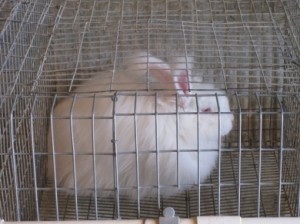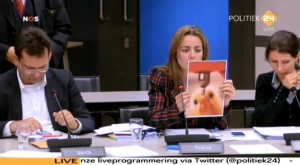Worldlog week 50 – 2013
Following our email campaign to stop the sale of angora wool, the big fashion chain WE Fashion was the first shop to remove angora products from its collection. WE Fashion has listened to its clients’ protests, fortunately. Let WE Fashion be an example to the other fashion chains so they will also promptly ban angora products from their shops! Read last week’s Worldlog for more information on our campaign.
Earlier, WE Fashion had already stated to cease production. Fashion chains H&M and C&A had also stated they would (temporarily) stop the production of angora wool, but they have failed to remove angora products from their collections until now. ZARA only placed a meaningless message on the party’s Facebook page, claiming their rabbits are doing really well. With the email campaign of the Party for the Animals, H&M, C&A and ZARA are therefore still called upon not only to cease production but also to stop selling angora wool any longer.
The Animal Welfare Policy Paper was discussed in the Lower House of the Dutch Parliament last week. I have hardly ever heard so many good intentions of parties in a debate on animal welfare. We carried 18 motions to ensure these will not remain good intentions alone, whilst clarifying the motions with photos. The photos all showed serious abuses in factory farming, such as breeding animals with genetic disorders, mutilating animals for economic reasons and denial of clean drinking water to pigs and chickens or open water to ducks that are bred for meat consumption.
Last week, we voted against the resolution of the European Union to allow Romanians and Bulgarians to work here without permits as from 1 January 2014. The resolution will lead to more exploitation and unemployment, as the economic situations in the various countries within the European Union are currently extremely unequal. For example, the minimum wage in Bulgaria is € 159 per month. To compare: the minimum wage in the Netherlands is € 1,478 per month. It is therefore more than likely that large groups of Bulgarian and Romanian workers will try their luck on the Dutch labour market, which already has an acute shortage of jobs.
Many workers from Romania and Bulgaria will be unable to find jobs at Dutch minimum wages in the Netherlands, as a result of which there is a risk they will establish themselves as pseudo self-employed workers, offering their services at extremely low hourly rates, with all its consequences.
Sometimes, allowing entrance to foreign workers from new EU Member States is called ‘showing solidarity’, but experience has shown that, in many cases, severe exploitation occurs. The Party for the Animals is a strong supporter of international cooperation and of helping less developed countries, but solidarity must not be confused with free entry of migrant workers and the consequent exploitation and disruption of the labour market.
I will never forget this statement of Nelson Mandela: It always seems impossible until it’s done Nelson Mandela 1918-2013 RIP
This is really beautiful!
Next Wednesday, I will go to Istanbul for our symposium on animal politics. I believe it will be an inspiring meeting! Will I see you there?
Greetings,
Marianne

